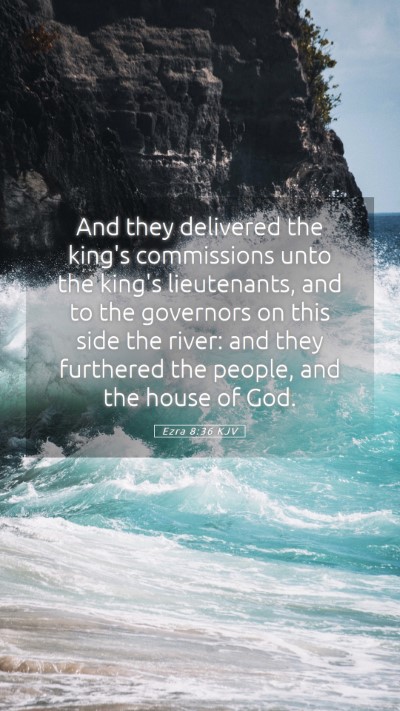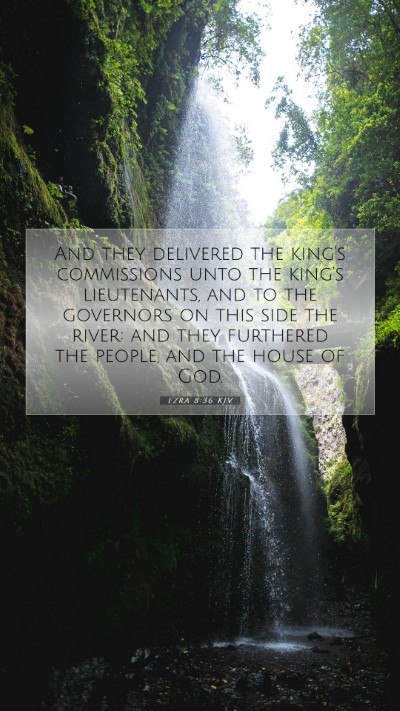Understanding Ezra 8:36
Ezra 8:36 states: "And they delivered the king's commissions unto the king's lieutenants, and to the governors on this side the river: and they furthered the people, and the house of God." This verse reflects the responsibilities taken by Ezra and the Jewish returnees to communicate with the Persian authorities while undertaking the construction of the temple in Jerusalem.
Bible verse meanings
In this passage, Ezra facilitates a connection between the Jewish people and the governing officials. He is depicted as a leader who ensures that the efforts of the exiles are recognized and supported. Various commentaries, including those by Matthew Henry, Albert Barnes, and Adam Clarke, illuminate the significance of this verse within the broader context of the Jewish restoration efforts.
Bible verse interpretations
- Matthew Henry’s Commentary: Henry emphasizes the importance of Ezra’s role in communicating effectively with local authorities. This reflects God’s providence in providing formal backing for the returning exiles, allowing them to continue their religious duties and reconstruct the temple.
- Albert Barnes’ Notes: Barnes points out that Ezra’s delivery of the king's commissions represents a form of civil authority intertwining with divine guidance. The favorable relationship established with the governorship plays a crucial role in the successful resettlement of the Jewish people.
- Adam Clarke’s Commentary: Clarke highlights the instrumental role of the king’s orders, as they granted not only permission but also protection for the Jews. The organized support garnered from the Persian Empire validates the significance of Ezra’s leadership and the importance of divine favor in the endeavors of God’s people.
Bible verse understanding
The understanding of Ezra 8:36 is enriched by recognizing the historical context of the return from Babylonian exile. This event comprises a fundamental aspect of Jewish identity and faith, as it signifies both physical and spiritual restoration. Ezra is portrayed as a spiritual leader, guiding the people in adherence to God's laws while also engaging with the secular authorities for their welfare.
Scripture analysis
Analyzing this verse in the light of the preceding chapters reveals Ezra's commitment to restoring worship and proper practices among the Israelite people. Such engagements with the kings and governors underpin the importance of diplomacy in carrying out divine commands through earthly means.
Bible verse explanations
Ezra's actions in this verse suggest a broader principle of balancing faith with civic responsibility. It illustrates the necessity of recognizing authority and seeking cooperation to further God’s plans in the midst of geopolitical complexities. This harmony between divine will and human governance demonstrates that God often works through established structures.
In-depth Bible verse analysis
Ezra 8:36 serves not only as a narrative of historical events but also as a timeless lesson for believers today. It challenges readers to consider how faith intersects with the authority of the world. Furthermore, it encourages contemplation of how spiritually-led initiatives can align with secular permissions to achieve communal goals.
Historical context of Bible verses
The historical setting of this verse is significant as it occurs after the Babylonian exile, when the Jewish people were permitted to return to their homeland. This restoration, sanctioned by the Persian king, symbolizes hope, renewal, and the fulfillment of God’s promises to his people. Ezra, being both a priest and a scribe, exemplifies the necessary interconnection between spiritual leadership and the administration of law and governance.
Cross References
- Ezra 1:1-4 - The decree by Cyrus allowing the Jews to return to Jerusalem.
- Ezra 7:14 - Ezra's mission and the supply of resources for the temple.
- Nehemiah 2:7-8 - Nehemiah discusses letters for timber for the wall, reflecting ongoing cooperation with authorities.
Application of Bible verses to daily life
For contemporary readers, Ezra 8:36 serves as a reminder of the importance of engaging with the structures of society while pursuing righteous goals. Believers are called to operate within their communities and governments, seeking opportunities to promote justice, mercy, and truth. It reframes the understanding of how to navigate personal, spiritual, and civic responsibilities harmoniously.
Bible study insights
In Bible study groups, analyzing Ezra 8:36 can lead to discussions on the ways in which modern Christians can foster relationships with authorities while advocating for Christian principles. Exploring how Ezra's example can influence today's social and political engagements fosters a deeper understanding of the faith's relevance in today's world.


